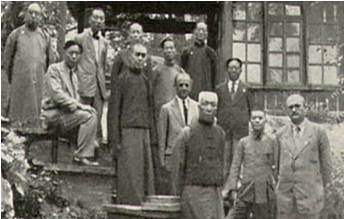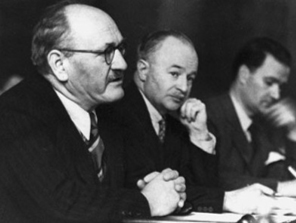|
||||||||||||||||||||||||||||||||||||
| [
Contents
] [ INDEX ]
|
||||||||||||||||||||||||||||||||||||
|
Page 118 |
||||||||||||||||||||||||||||||||||||
|
History of medicine Andrija Štampar - founder of the Yugoslav Public Health Service and Yugoslav ambassador to the WHODušan Petar Kuljančić |
||||||||||||||||||||||||||||||||||||
|
|
||||||||||||||||||||||||||||||||||||
| Download in pdf format | SUMMARY: Andrija
Štampar was born in 1888 in the village of Brodski Drenovac in
Slavonia, and died in 1958 in Zagreb. He was a Yugoslav and Croatian
doctor and scientist most deserving of founding public health and
social medicine in the Balkans in the first half of the 20th
century. He graduated from the Medical Faculty in Vienna in 1911
with a doctorate in general medicine. Even as a medical student, he
wrote articles and pamphlets with the goal of educating and
enlightening people about prevention and maintaining health. He
began his professional career working as a municipal doctor in Nova
Gradiška, and from 1919 to 1930 he worked as the head of the hygiene
department of the Ministry of Public Health in Belgrade, and in that
period he worked on founding a health service in the former
Yugoslavia. He organized more than 250 public institutions important
for health work. With his dedicated and tireless work, he tried to
establish a doctor as a public and social worker and a national
teacher and educator, who is economically independent and equally
accessible to all strata of society. He emphasized the importance of
preventive medical work. From 1930, his more significant engagement
at the international level began. He works as a hygiene expert at
the League of Nations in many European countries, in the USA and in
China, where he is credited with the reform of the health service.
He spent the years of World War II as a detainee in a prison in
Graz. After his release, he continued to work in the field of public
health and science, as the director of the School of Public Health,
dean of the Faculty of Medicine, rector of the University of Zagreb,
memeber and president of the Yugoslav Academy of Sciences and Arts
JANU (1947-1958). Along with a rich professional career in the
country, he achieves notable successes in the organization of the
public health service and in the world. He has been working on the
founding of the World Health Organization since 1946, and after
writing its constitution in the summer of 1948, he chaired the first
Assembly of this highest health body in the world in Geneva. Keywords: History of medicine; Faculty of Medicine-Zagreb; Faculty of Medicine-Belgrade; Yugoslavia; public health; social medicine |
|||||||||||||||||||||||||||||||||||
| Andrija Štampar
was born more than 130 years ago in a small Slavonian village
(Croatia) in the area of the Austro-Hungarian monarchy. His father
was a teacher, and because of his service, the family often moved.
So Stampar had a lot of time to observe the everyday life of
ordinary people. At that time, there were no doctors or medical
services in the villages in the Balkans. We are talking about the
backward society of peasants immersed in ignorance, which had great
negative consequences for the health of the people. From 1898 to
1906 he attended the Gymnasium in Vinkovci, which he finished as an
excellent student. He began his medical studies in 1906 in Vienna,
then the most important medical center in the world [1]. He
completed them in just 5 years and 2 months, on December 23, 1911.
While a student, he published over 70 articles and brochures, mostly
aimed at health education, and gave a series of public lectures in
Vienna and his homeland. Most importantly, however, it was during
this period that he formed his clear views on social medicine. He
was simply a man who knew exactly what he wanted, and at the same
time energetic, persistent, uncompromising, self-confident [2]. In
1909, in Nova Gradiška, he founded his own journal called the Public
Health Library, in which he wrote articles on numerous topics on
health and disease prevention. After finishing his studies, Dr.
Štampar was first employed in Karlovac, and then he was transferred
to Nova Gradiška and promoted to municipal doctor [3]. During World
War I, he worked as a doctor in a prison camp in Mathausen, Austria
[2]. After the end of the war, as one of the few highly educated
people in the newly formed state of the Kingdom of Serbs, Croats and
Slovenes, he was appointed a health advisor in the Social Welfare
Commission of the National Council in Zagreb [4]. In 1919, he gave a
lecture on children's health at the Congress of Allied Countries on
Social Hygiene in Paris. Even then, he clearly showed that he has a
clear concept of organizing a public health service [3]. Picture number 1. Andrija Štampar (on the right)
in Lanchow, China, in 1930’s [6] After the political changes in the then Kingdom of Yugoslavia,
Štampar returned to Zagreb in 1939, where his election as a full
professor of hygiene and social medicine was finally confirmed. As
the most mature and most experienced teacher, he was elected dean of
the Medical Faculty in Zagreb the following year, and thus dedicated
himself to reforming teaching within the medical profession. This
fruitful work was soon interrupted again by the German invasion of
Yugoslavia in 1941. Immediately after the establishment of the
Ustasha regime, Štampar was arrested and once again, as politically
unfit, was interned in a camp in Graz, where he was liberated in
1945 [2]. Picture number 2. The Interim Commission met in
Geneva in 1946. From left, Dr Štampar, a president to the commission
[6] At the eighth regular session of the World Health Organization in
1955 in Mexico City, Andrija Štampar was awarded the recognition of
the Leon Bernard Foundation for all work and achievements in the
field of public health and social medicine [3]. SUMMARYLife and work of prof. Dr. Andrija Štampara are extremely
important for the young generations of doctors and scientists from
this area. Despite various economic and political turmoils and
obstacles in the hilly Balkans, his diligent work, perseverance and
dedication led Dr. Stampar to unprecedented successes in the
international health field. Dr. Štampar even twice created a health
service in his homeland out of nothing. His ideology was a belief in
the primary social role of health and in the possibility of
improving it with social and medical measures, because, as he said
more than once, "everyone has the right to health" [2]. LITERATURE:
|
||||||||||||||||||||||||||||||||||||
|
|
||||||||||||||||||||||||||||||||||||
|
Corresponding Address: Dušan Petar Kuljančić, Univerzitet u Novom Sadu, Medicinski fakultet, Novi Sad E-mail: dulekuljancic@gmail.com |
Paper received: 26.10.2019. Paper Internet issues: 26.11.2020. |
|||||||||||||||||||||||||||||||||||
| [
Contents
] [ INDEX ]
|
||||||||||||||||||||||||||||||||||||
|
||||||||||||||||||||||||||||||||||||


